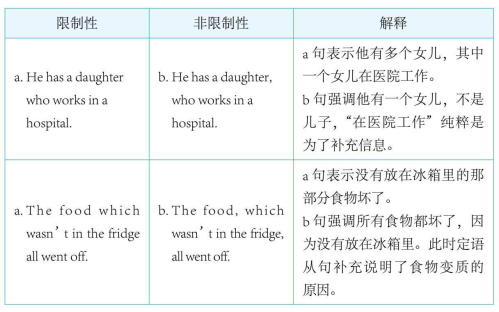26 用或不用逗号隔开,句义有差别 Track 026
在英语中,还有一类句子用限制性或非限制性定语从句都可以,但强调的意义不同,句义有区别。试比较:

a. The cab drivers who knew about the traffic jam took another road.
知道那里堵车的出租车司机换了另一条路。(言外之意:不知道的司机则没有换路线,只有部分司机换路线了。)
b. The cab drivers, who knew about the traffic jam, took another road.
出租车司机知道那里堵车了,他们都换了另一条路。(全部司机都知道,都换了行驶路线。)
最后,请注意上述两种定语从句在翻译上的差别。
限制性定语从句一般翻译成定语的形式“……的”,而非限制性定语从句往往译成各种状语。例如:
c. The food, which wasn’t in the fridge, all went off.
所有食物都坏了,因为没有放在冰箱里。(译成原因状语从句)
d. The ambassador gave a dinner to the scientists, with whom he especially wished to talk.
大使宴请了那些科学家,因为他特别想与他们交流一下。(译成原因状语从句)
e. The people were desperate for work, any work, which could support their family.
人们急于找到工作,什么工作都行,只要能养家糊口。(译成条件状语从句)
f.The millionaire had another house built, which he didn’t need at all.
那位百万富翁又建了一幢房子,尽管他并不需要。(译成让步状语从句)







